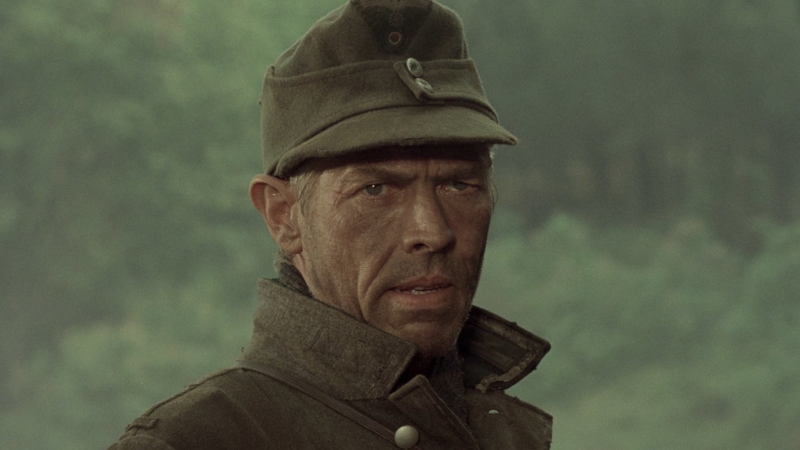Director – Sam Peckinpah – 1977 – UK, Germany – Cert. 15 – 132m
Movie ***1/2
4K Blu-ray *****
A German corporal on the WW2 Russian front takes exception to an aristocratic officer’s attempts to take credit (and a medal) for a dead officer’s bravery – out in a 4K restoration on UHD Steelbook, Blu-ray & DVD from Monday, July 31st
The Taman Peninsular on the Russian Front in World War II. German army Corporal Steiner (James Coburn) leads his small reconnaissance unit in a successful attack on a German position, taking captive an underage Russian recruit rather than killing him. His war-weary senior officer Colonel Brandt (James Mason) and assistant Captain Kiesel (David Warner) are joined by enthusiastic Captain Stransky (Maximilian Schell) who was previously in France and has come to Russia determined to earn an Iron Cross to impress his aristocratic, Prussian family.
In his first encounter with Steiner, Stransky orders him to shoot the teenager captive, as they have been ordered to take no prisoners. Steiner instead hides the boy among his unit, letting him go during a Russian attack on the base, hoping the boy can return to his own forces, but alas the boy is shot by advancing soldiers on his own side. Steiner warns Stransky that he expects an imminent, large Russian attack on their base.
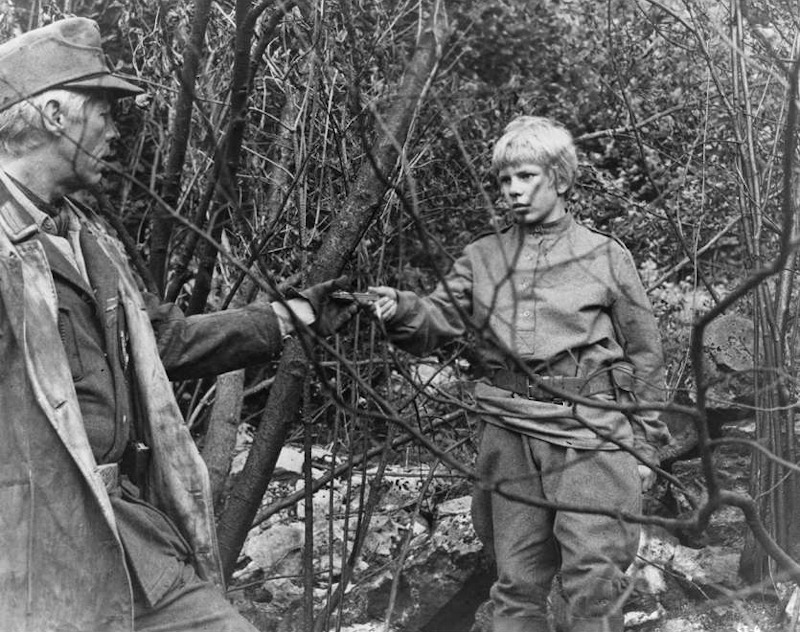
Stransky, meanwhile, promises his adjutant Lieutenant Triebig (Roger Fritz) a transfer to France if the latter will help him. When the Russian attack comes, Lieutenant Meyer (Igor Galo) leads a successful counterattack, in which he himself is killed. The injurer Steiner is transferred to a military hospital where he briefly moves in with the nurse (Senta Berger) who cures him before returning of his own accord to the Front.
Stransky asks Steiner to sign a statement, already signed by Triebig, commending Stransky for an Iron Cross for his bravery in the counterattack (in which he didn’t fight). Steiner refuses.
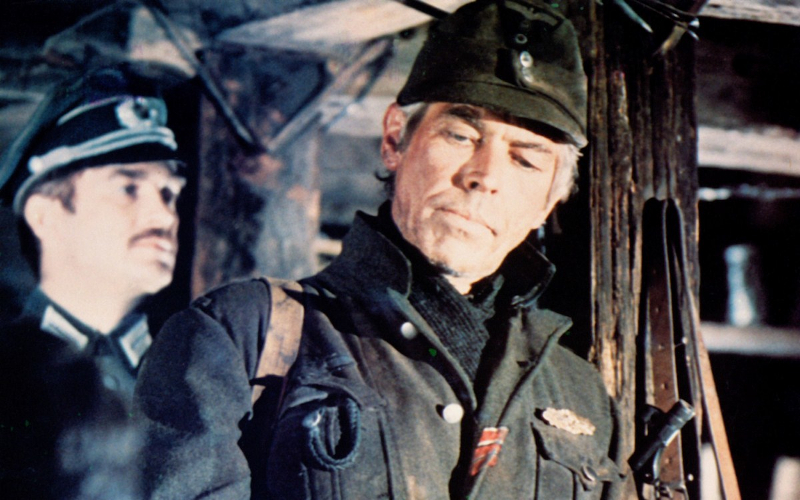
When the chain of command orders the entire army and all its recon units to retreat, including that of Steiner, Stransky defies the order to see that Steiner is not informed, hoping instead he will be trapped and killed by the enemy.
Opening to poor reviews on release but having gained a more positive reception in some quarters in the intervening years, Cross of Iron is a late work in the Peckinpah filmography, overshadowed by a number of prior Westerns including The Wild Bunch (1969), Oscar-nominated for its screenplay, as well as notorious, Cornish defend-the-family-homestead drama Straw Dogs (1971) and unashamedly commercial crime outing The Getaway (1972), after which he had a string of box office failures. His films mostly focus on male groups in conflict situations, an aesthetic of slow motion violence, and are noted (often unfavourably) for misogyny.
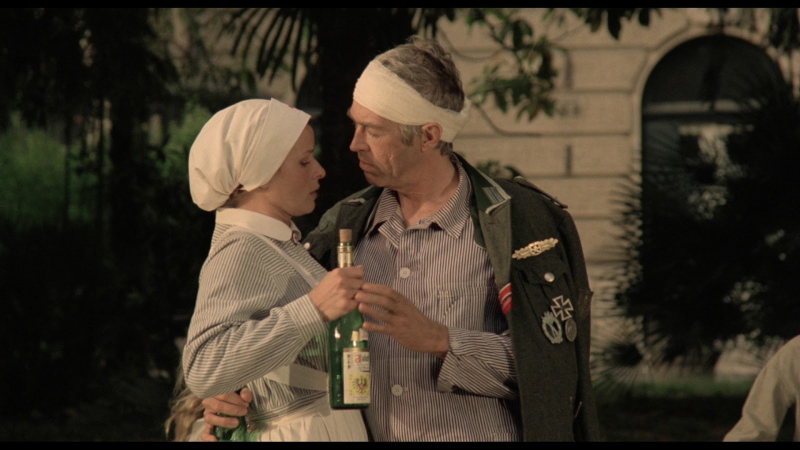
Aside from the fact its director sorely needed a hit, Cross of Iron had a number of problems. Its German producer Wolf C. Hartwig had a budget, but also cashflow delays which interfered with logistics. On Peckinpah’s side, his long-standing alcohol problem had reached a point where, according to some reports, he would periodically lose several days of shooting to the effects of drink. In some of the extras on this disc, actors and other collaborators talk about his getting through four bottles of whisky or similar a day, not all of them on his own. However, they also describe a focused man with a rigorous work ethic. So maybe there’s some truth in those reports of lost days, or maybe they are simply unsubstantiated rumours by parties with an axe to grind.
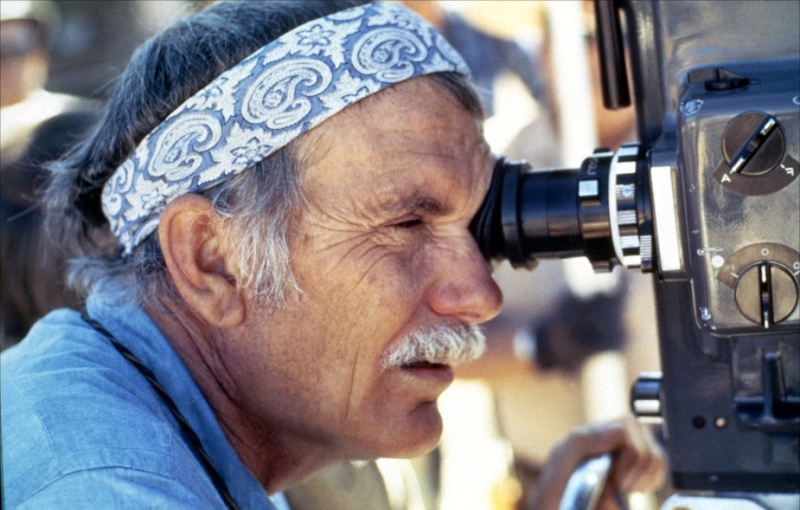
Peckinpah’s trademark practice of shooting at high speed for slow motion and shooting such scenes with multiple cameras made the production more expensive in terms of the considerable amount of film stock used. Budget overruns eventually made the producers attempt to shut down the film before the ending was shot, but actor Coburn managed to keep them at bay and have Peckinpah at least shoot a cheap, improvised ending. The ending as it exists is one of the least satisfying parts of the film.
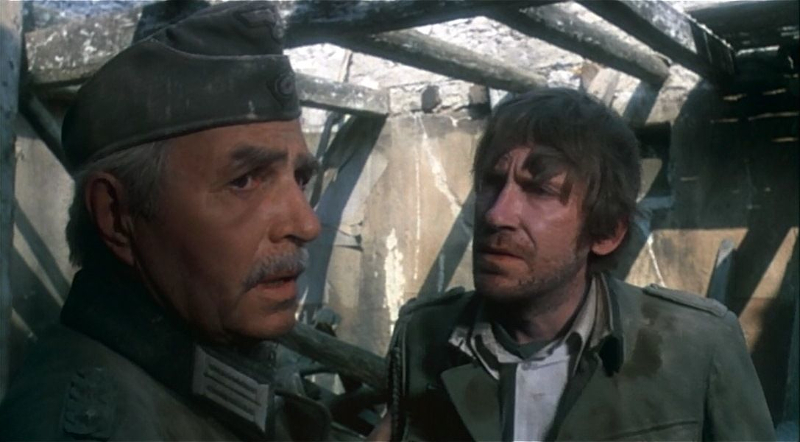
The casting is curious. Like most other Western war films of this period and earlier, the Germans speak in English. So, here, one is expected to believe the ethnically diverse likes of Brits Mason and Warner, American Coburn and Swiss Maximilian Schell are all Germans. (You can watch the dubbed German version with on this disc instead, with English subtitles, which gets round this problem, but then you lose the original voices of the actors.) That doesn’t work for an audience today familiar with German language WW2 movies such as Das Boot (Wolfgang Petersen, 1981 – made a mere four years after this – and its 2018 TV series remake) and All Quiet on the Western Front (Edward Berger, 2022). For that matter, it might have worked better it had had a one nationality cast, much as, for example, the German U-boat crew of 49th Parallel (Michael Powell, Emeric Pressburger, 1941) was played by an all British cast speaking in English.
If one can look past that, however, the quiet Mason and the wilder Warner give nicely understated performances as the disillusioned colonel and his adjutant, demonstrative man of action Coburn seems the perfect Steiner, while Schell, the one top member of the cast believable as a German, carries himself with just the right sense of privilege and disdain. Aside from the big stars, all the other parts are played (in English) by German actors, among them Vadim Clowna and Roger Fritz.
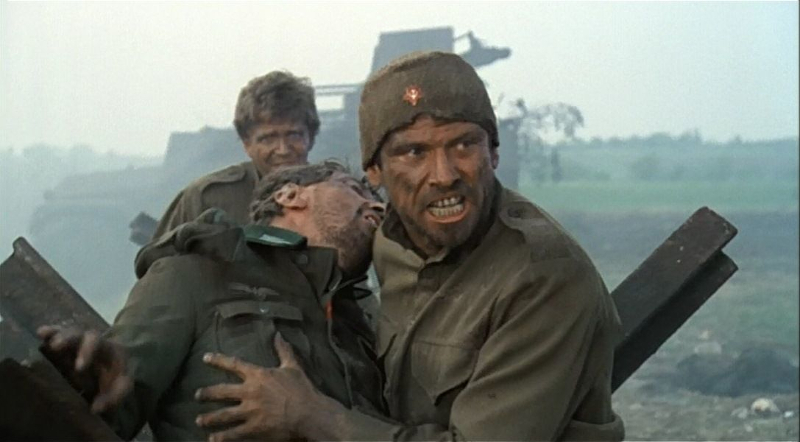
The military hardware used is also impressive in terms of historical accuracy, not least the T34/85 tanks supplied by the Yugoslavian government (the film was shot in what was then Yugoslavia) which get quite a bit of onscreen time. There are no more than three of these in any one shot, and only two of them are mobile. The production was promised more tanks, but they never materialised possibly because of the production’s cash flow problems.
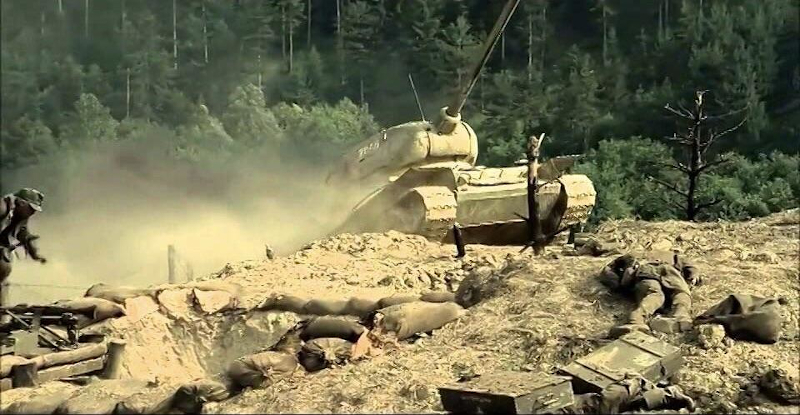
Far too much of the film falls back on Peckinpah’s trademark slow motion violence, as bullets fly, explosives blow up and bodies fly or fall, which works well enough in The Wild Bunch where it feels more purposeful and central to the director’s vision without actually comprising it. When a tool for portraying your vision actually becomes that vision, you’re in trouble.
Still, the piece has a certain coherence about it; you can always follow who’s who. Moreover, it’s not kind to the system of class and privilege it both portrays and critiques, with Steiner commenting that the likes of Stransky live in a very different world from most troops in combat, a concept underscored in the closing reel when the German position is under attack and the hapless officer is seen struggling with the basic process of reloading his gun.
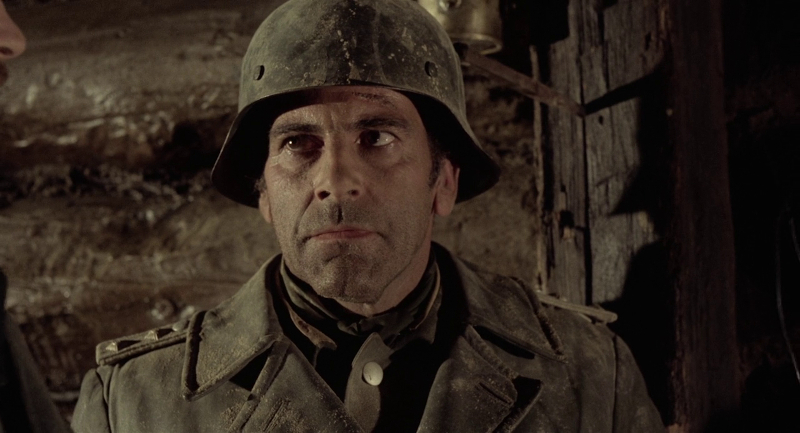
—
As for the current Blu-ray release, from which this review was written, much care has gone into the 4K restoration process, which looks stunning. The restored print starts off with archive footage from WW2, and your first thought looking at these black and white shots is, these look so clean, and in such good condition. Our first shot of James Coburn’s Steiner is in black and white just before this sequence turns to colour (blacks, whites and reds of Nazi German flags, greens of soldiers uniforms and the landscape they imitate), a very effective piece of shooting and editing, as if the character were participating in history.
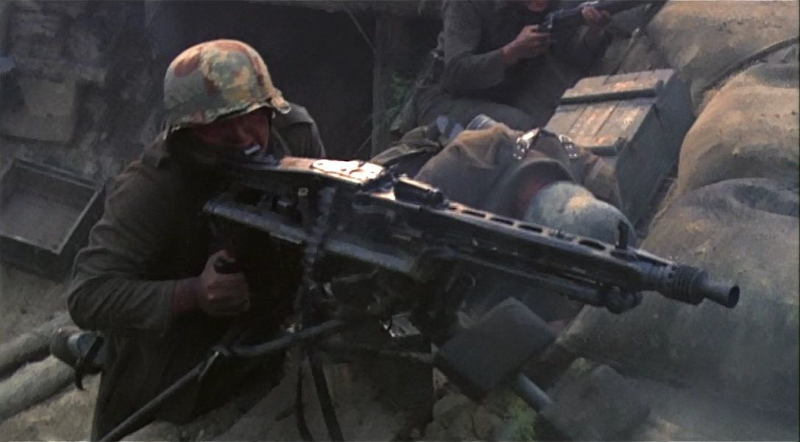
The UHD Steelbook and the Blu-ray (but not the DVD) also contain extensive extras. One of them is a commentary by filmmaker and film historian Mike Siegel, a speaker of both English and German (he does two commentaries, one in each language, I imagine each covering much the same ground) who has amassed a massive amount of information in his own personal archive about Peckinpah and his films over the years and is behind many of the extras on this disc.
The commentary is mostly non-scene specific. As it proceeds, it details a lot abut Mike’s various meeting with or attempts to track down Peckinpah collaborators for his various film projects on the director and his work. You sense he’s a genuine enthusiast who’s also extremely knowledgeable, and that the viewer is in good hands. Much of the commentary works like radio – it’s fascinating to listen to, but mostly not to watch – I found my ears alert but my eyes closing. Although a few times he’ll alert you to a scene coming up about which he has something specific to say, at which point your eyes open again.
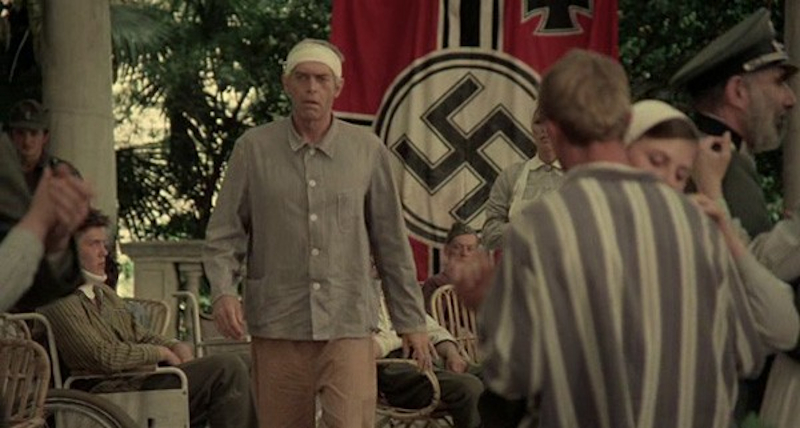
Not that Siegel lacks a visual sense: he has also compiled a number of slideshows of various stills from the film, underscored by Ernest Gold’s original soundtrack music. These are well-ordered and paced, beautiful to watch and convey a real sense of the film itself. He has also put together a fascinating 47-minute featurette Passion and Poetry: Sam Peckinpah’s War (2022) which includes insightful interview material from cast members James Coburn, Senta Berger, David Warner, Vadim Clowna, Roger Fritz and the director’s long-standing collaborator Katy Haber. In addition, Siegel has made a number of five minute shorts about the film using additional material that was left over. English and German trailers and a US TV spot complete the package.
Thanks in large part to Siegel’s expertise, knowledge and enthusiasm, a lot of care has gone into the extras on this two-disc set to accompany the superb 4K restoration. A terrific disc release, at least in the extras-laden UHD Steelbook and Blu-ray versions, one with the potential to make you think again about a film often written off as one of its director’s lesser works.
Cross of Ironis out in a 4K restoration on UHD Steelbook, Blu-Ray & DVD in the UK on Monday, July 31st.
Trailer (not of the 4k Restoration):
